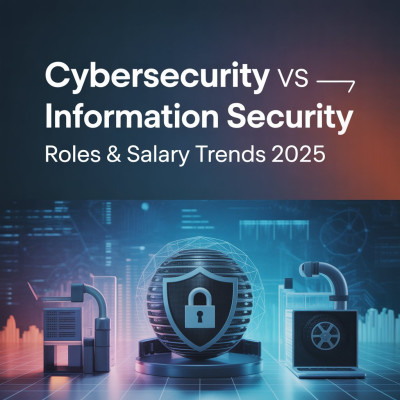
Precious Azuonwu
 cyber security roles, cyber security demand
cyber security roles, cyber security demand
 0 comment
0 comment
 17 Aug, 2025
17 Aug, 2025

The digital world keeps evolving, and with it comes the need for experts who can protect data and systems from ever-changing threats. While cyber security and information security may sound similar, they are distinct fields—each with its own roles, skills, and salary potential. In 2025, the demand for both is at an all-time high. Let’s break down the differences, career opportunities, and earning trends.
Cyber security focuses on protecting digital systems, networks, and online assets from hackers, malware, and cyberattacks. It’s the front line of defense against online threats.
Information security, or InfoSec, is broader—it protects all forms of information, whether digital, physical, or even verbal. This could be anything from server data to paper files.
Both aim to protect sensitive information, but cyber security is a subset of information security. Think of it like this: all cyber security is information security, but not all information security is cyber security.
Cyber security requires technical expertise in coding, network defense, and threat detection. Information security demands policy-making, risk management, and understanding of regulatory compliance.
In 2025, cyber security professionals earn $85,000–$160,000 annually, depending on experience and location. High-demand roles like ethical hackers can command even higher pay.
Information security specialists average $80,000–$140,000 yearly. Top-paying roles include compliance managers and data protection officers.
If you enjoy hands-on problem-solving with technology, cyber security might be your best fit. If you prefer strategy, compliance, and policy-making, information security may suit you better.
Both fields offer growth in areas like cloud security, AI-based defense, and blockchain protection.
Artificial intelligence, quantum computing, and 5G networks are reshaping how cyber threats are detected and stopped.
Blockchain-based identity verification and enhanced privacy frameworks are setting new standards in protecting information.
Experts predict a 20%+ growth in job openings for both fields over the next five years, with salaries rising as companies compete for talent.
Cyber security protects digital systems from cyber threats, while information security safeguards all forms of information, both digital and physical.
On average, cyber security pays slightly more due to its high technical demand, but senior information security roles can match or exceed it.
Employers look for degrees in IT or computer science plus certifications like CISSP, CEH, or CompTIA Security+.
Yes, with increased data protection regulations worldwide, demand is strong in multiple industries.
Professionals with recognized certifications can earn 20–30% more than those without.
Yes, with additional technical training and certifications, many InfoSec professionals move into cyber security roles.
The U.S., Switzerland, Australia, and Singapore consistently rank among the highest-paying countries.
Precious Azuonwu
0 comment